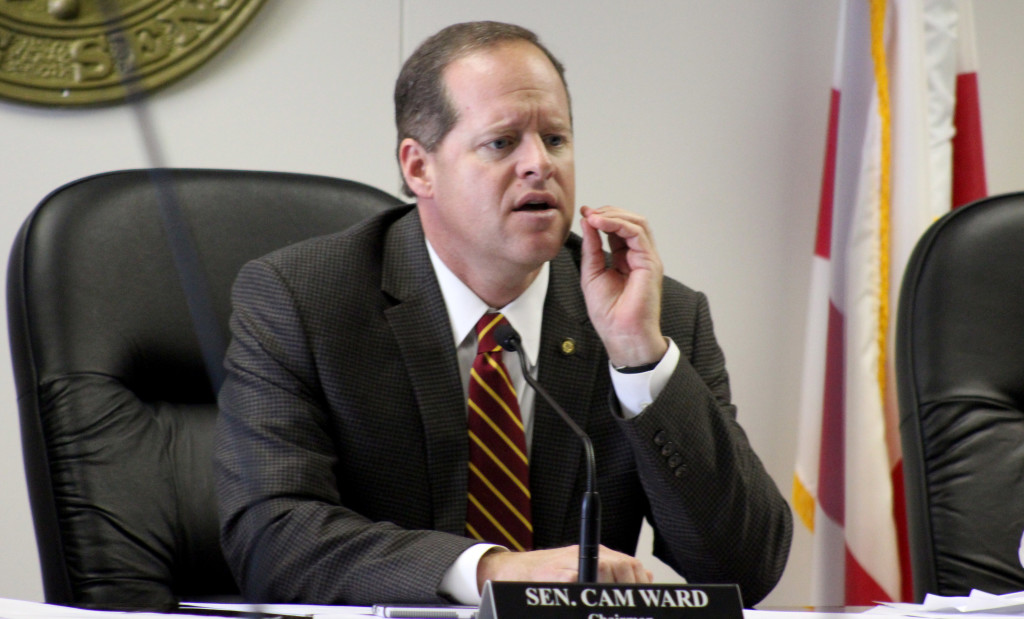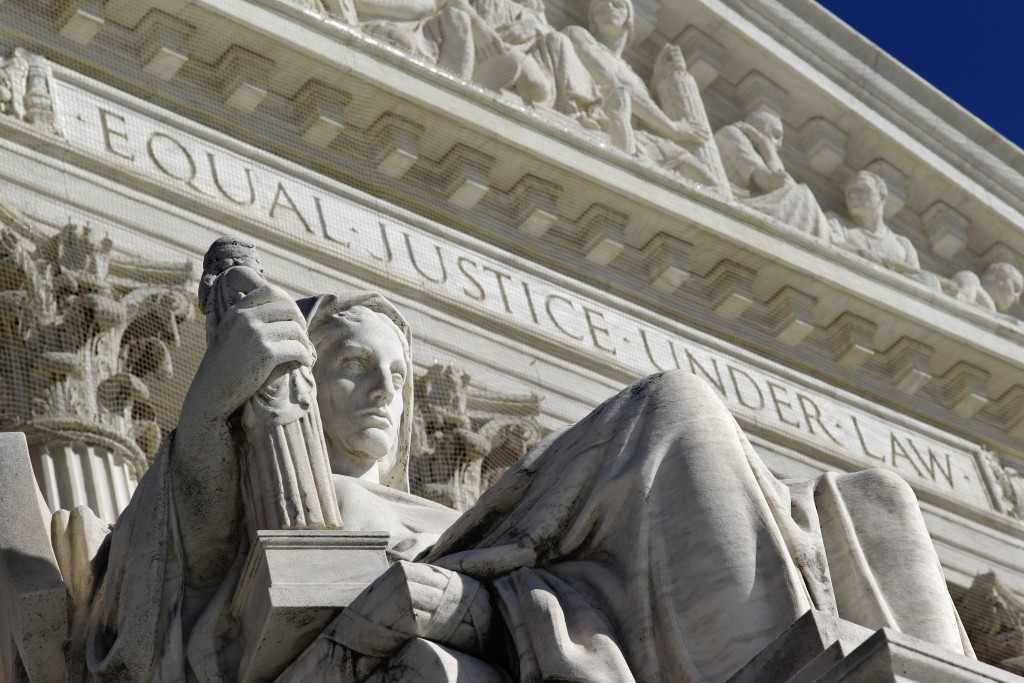Donald Trump: Is he the quintessential Florida Man?

Donald Trump drew thousands to his rallies around the Sunshine State, basking in their adoration, his face glowing like a Florida orange as he anticipated victory. “Florida loves Trump, and I love Florida, so I think I’m going to win Florida,” he repeated. Trump did win Florida on Tuesday, claiming victory with the bravado of someone who survived a particularly hellish South Florida commute. The only actual Floridian in the race — Marco Rubio, a Cuban-American born in South Florida who earned all his degrees from Florida universities — failed to make his case, and Trump had already squashed the hopes of the GOP’s other Florida candidates like so many palmetto bugs. Former Gov. Jeb Bush, who was supposed to have this thing locked up before the Southern primaries, flamed out shortly after he finally tried to find Trump’s jugular by labeling him “the chaos candidate.” Ben Carson, who lives in a West Palm Beach mansion, finally quit, too, and endorsed Trump. Somehow, it’s Trump who captured Republican hearts in what some consider America’s strangest state. Trump made his name in New York City, displaying “New York values” with a brash, fast-talking, larger-than-life persona. But really, when you think about it, Donald Trump is the quintessential Florida Man. “He embodies the Florida dream: the idea of a better life,” says historian Gary Mormino. All the things people fantasize about in the frigid north — a beachfront mansion and endless riches to spend on endless rounds of golf — Trump has it and more, right here in Florida. And he doesn’t just live the Florida lifestyle — he’s a Sunshine State soul mate. “Trump is more casual, more flippant, less buttoned up, just like Floridians,” says Paul George, a history professor at Miami-Dade College. But what about Rubio, the actual Floridian who dropped out of the race after Tuesday night’s crushing loss? Rubio seems youthful and has a vision for America, but “comes off as restrained,” George says, “much more buttoned up, which is ironic, since he’s from Florida.” Like each winter’s snowbirds and two-thirds of state residents, Trump is from outside Florida. But he plays and does business here. In 2010, he launched a multilevel marketing company that sold vitamins to an adoring crowd of thousands in Miami. Earlier this month, after 2012 GOP nominee Mitt Romney declared that “a business genius he is not,” Trump summoned the media to his Trump National Golf Course in Jupiter. “He’s an empire builder, and Floridians, especially South Floridians, are empire builders,” says George. “Or they dream of building an empire.” While his Trump Tower penthouse in New York imitates the Palace of Versailles, his most famous home has been Mar-a-Lago. In 1985, he paid $10 million for the 58-bedroom Mediterranean revival mansion with a 20-acre oceanfront estate straddling Palm Beach Island. Trump and his third wife, Slovenian model Melania Knauss, held their wedding reception at Mar-a-Lago, which Trump had turned into a high-end club, much to the consternation of his traditional Palm Beach neighbors. “Trump’s Palm Beach Club Roils the Old Social Order” was the headline on The Wall Street Journal story. That’s another Florida Man attribute: roiling the social order. Trump’s been doing it for years. Mormino, a professor emeritus at the University of South Florida-St. Petersburg, points out Trump bought into Palm Beach when national ads by the tourism bureau proclaimed: “Florida. The rules are different here.” That could almost be Trump’s campaign slogan, no? Take his four corporate bankruptcies: No big deal in Florida, which trails only California in bankruptcy filings. Or his marriages: 7 percent of Florida’s men have married three or more times, like Trump. The national average is 5 percent, according to the Pew Research Center. Or the fact he has made and lost fortunes in real estate. Floridians still gamble on slices of sunshine, despite the last housing bust. “Trump’s got the Florida values and Florida lifestyle down,” says George. Trump’s brand was nicked by a failed condo project in Tampa, but that, too, was classic Florida. Trump boasted in 2005 the 52-story Trump Tower Tampa would be “a signature landmark property so spectacular that it will redefine both Tampa’s skyline and the market’s expectations of luxurious condominium living.” Two years later, Trump sued for $1 million in unpaid licensing fees, the developer went bankrupt, and buyers who put 20 percent down on a tower that was never built were out tens of thousands of dollars. “Trump was like the Pied Piper who led us all into it, trusting him that he wouldn’t put his name on something bad,” said Mary Ann Stiles, a Tampa attorney who lost $100,000 on the deal. Ah, but no one wants to dwell on the bad here. They’d rather play — preferably under the cool shade of a palm tree — like golfers and presidents John F. Kennedy and Richard Nixon did when they set up their Winter White Houses in Florida. Trump has three world-class golf courses in Florida — Doral, Palm Beach and Jupiter. He invested hundreds of millions into Doral after rescuing it from bankruptcy, and the course has been a popular PGA Tour stop since 1962. But golf-watchers say this run is threatened by Trump’s remarks: the PGA canceled its Grand Slam of Golf at Trump’s course in Los Angeles after his comments disparaging Mexican immigrants, and Doral could be next. Trump-haters may seek solace in this tidbit that Mormino pointed out: No Florida man has ever been elected president. Republished with permission of The Associated Press
Despite concerns, bill allowing cameras on school buses passes committee

The House Judiciary Committee approved a bill Wednesday which would authorize local school boards to install cameras on school buses to catch people who violate stop signs on the side of buses. The bill makes it optional for school districts to do so. SB215 from Sen. Jimmy Holley (R-Elba) brought forth the bill because he aims to create a “safe environment for our school children to get on and off school buses.” Holley noted that there are multiple accounts each year of children being injured due to a driver’s failure to yield to a school bus’s stop sign and hundreds of related offenses. Rep. Juandalynn Givan (D-Birmingham) voiced multiple concerns over the legislation, specifically how the cameras would be installed and maintained. Holley said that it would the responsibility of local school boards to pay for the cameras, noting that it might require multiple cameras on each school bus. Concerns were also voiced over the constitutionality of such cameras, with lawmakers noting that cameras on street lights and in unmanned police cars are widely unpopular and often unconstitutional. Holley had no real explanation as to what makes these cameras different, only that they would go a long way in curbing the practice of ignoring school bus signals and provide ways to prosecute those who do. Further concern was raised over the fact that law enforcement is not involved in the installation of the cameras, but Holley affirmed that local law enforcement must be brought into the fold when a municipality decides to install such cameras. The cameras will shoot footage of the offender’s license plate, therefore holding accountable the car owner regardless of who is operating the vehicle. The bill has already passed the Senate and its passage through the House committee clears it for a reading before the full House of Representatives.
Bills to increase porn penalties pass Senate Judiciary Committee

Two bills aimed at stemming the flow of pornographic material passed the Senate Judiciary Committee Wednesday. One, providing further penalties for people disseminating explicit photos of persons under 17 and the other tackling the issue of “revenge porn” as used to harass a former partner. Ward’s SB179 that a person found guilty of transmitting or possessing pornographic photos of a minor must register as a sex offender. The bill removes the current requirement that the transmission require a monetary exchange to be a punishable offense and includes “breast nudity” as a possible offense. SB342 from Sen. Vivian Figures (D-Mobile) makes it a Class A felony to unknowingly film a sexual partner and display such recordings online or otherwise. Figures noted that the bill was brought to address “revenge porn,” which has gained popularity with the advent of mass social media use.
Bills to give law enforcement officers more power pass Senate Committee

The Senate Judiciary Committee Wednesday approved two bills aimed at giving more power to law enforcement officers. One would allow tracking devices to be placed on vehicles once a search warrant is attained and the other would allow officers to issue citations at the scene of an accident for crimes they did not witness. HB96 from Rep. Christopher England (D-Tuscaloosa) makes uniform the process by which local law enforcement can attach an electronic tracking device to suspects’ vehicles. England noted that such strategies are already employed across the state, but many counties have varying procedures for how they are executed – his bill would make the process the same in every county. HB1 from Rep. Phillip Pettus (R-Killen) passed both the House and Senate last year but was ultimately vetoed by Gov. Robert Bentley for allegedly undermining current DUI laws. “This is one of those bills I had a problem with last year,” Sen. Bobby Singleton (D-Greensboro) said, claiming the bill gives too much power to law enforcement officers. “I just have a fundamental problem with an officer subjectively driving up to a scene and issuing a citation for something they didn’t see, especially for a non-moving violation.” An amendment brought forth by Sen. Rodger Smitherman (D-Birmingham) addressed those concerns and the bill received a favorable report.
Senate committee greenlights Ten Commandments for display on school, state property

With little discussion, the Senate Judiciary Committee gave a favorable report to SB97 from Sen. Gerald Dial (R-Lineville) allowing the Ten Commandments to be displayed on state property and at public schools. Committee chairman Sen. Cam Ward (R-Alabaster) noted that the bill has passed out of committee several times over the years and always stalls in one of the legislative bodies. Sen. Linda Coleman-Madison (D-Fairfield) lodged the only opposition to the bill. “Whatever happened to the separation of church and state?” she questioned. Despite the limited opposition, the bill was OK’d within seconds of being brought up.
John Merrill lays out information on School Board runoff election

Alabama Secretary of State John Merrill released information Wednesday regarding an April 12 runoff election in Mobile County. The election is for the District 1 State School Board member and pits Republican incumbent Matthew Brown against newcomer Jackie Zeigler. In the March 1 election, neither candidate got enough votes to outright win the party’s nomination. Because Mobile Public Schools will be enjoying Spring Break the week of the runoff, many residents will likely be out of town. Because of that, Merrill has released instructions on how residents can obtain an absentee ballot and cast their votes. Voters can download an absentee ballot application through the Secretary of State’s website or request one in person at 205 Government St. in Mobile. The last day to request a ballot is April 7. Ballots returned by mail must be sent by April 11 and received by noon on Election Day. Absentee ballots submitted in person must be turned in by close of business April 11. For information, contact Merrill’s office at (334) 242-7200.
Alabama reacts to Barack Obama’s Supreme Court nominee

President Barack Obama Wednesday nominated U.S. Court of Appeals Judge Merrick Garland to the U.S. Supreme Court to fill the vacancy left by Justice Antonin Scalia who died last month after sitting on the court for three decades. Here’s what Alabama politicians are saying about the President’s nominee: U.S. Sen. Richard Shelby: President Obama and I strongly disagree on which direction to take our nation, and I believe that we should do everything in our power to block him from further damaging the future of America. Rather than nominating an individual who will preserve the conservative legacy of the late Antonin Scalia, President Obama is attempting to solidify his liberal agenda by drastically changing the direction of the Court for decades to come. This critical decision should be made after the upcoming presidential election so that the American people have a voice. I am adamantly opposed to any Senate action on President Obama’s nomination of Judge Garland to the Supreme Court, and I urge my conservative colleagues to join me. U.S. Rep. Bradley Byrne (AL-01): The President has the authority to nominate anyone he wants to serve on the Supreme Court; however, only with the advice and consent of the Senate may that person be appointed to the Court. As I have said before, the Senate should not confirm a new Supreme Court justice until a new president is elected. This is not about Judge Garland. This is about ensuring the American people have a chance to weigh in through the electoral process before such an impactful decision is made. U.S. Rep. Martha Roby (AL-02): As a conservative, Representative Roby believes a strict constitutionalist in the mold of the late Justice Scalia should fill this important vacancy. However, the House of Representatives plays no role in the process of filling Supreme Court vacancies. The Constitution grants the president the authority to nominate justices to the high court, but only with the consent of the Senate. While President Obama has selected his nominee, the Senate has every authority to withhold its consent, which appears to be the case here. U.S. Rep. Mike Rogers (AL-03): Has not responded to request for comment. U.S. Rep. Robert Aderholt (AL-04): Has not responded to request for comment. U.S. Rep. Mo Brooks (AL-05): Has not responded to request for comment. U.S. Rep. Gary Palmer (AL-06): No comment. U.S. Rep. Terri Sewell (AL-07): In fulfillment of his constitutional duty, President Obama has nominated a qualified jurist to the United States Supreme Court. Merrick Garland is a highly qualified jurist on the U.S. Court of Appeals for the D.C. Circuit and is deserving of a confirmation hearing from the Senate. America expects the United States Senate to do its job and give the President’s nominee fair consideration and a timely vote. Our democracy demands that our leaders lead and do their jobs– the American people deserve no less. This article will be updated as additional reactions come in.
Prison reform bill passes committee, moves forward to full Senate

On Wednesday, the Senate Committee on General Fund Taxation and Finance passed the long-debated Alabama Prison Transformation Initiative Act, clearing its path to go before the full Senate next week. SB287 from Sen. Trip Pittman (R-Daphne) provides an $800 million revenue bond for the demolition of 14 of Alabama’s 16 prisons and subsequent renovation of the remaining two. The bill further provides for the construction of four new prisons, three male and one female, which will pay off the bond through perceived savings. As collateral, the bill provides a 1-mill tax currently reserved for funding the Alabama Department of Human Resources (ADHR) and the Alabama Department of Veterans Affairs (ADVA). Proponents say that the tax would only be used if the Alabama Department of Corrections (ADOC) defaults on its bond payments, which is not expected to happen. In previous committee meetings, opponents spoke out against the 1-mill tax commitment as well as the design/build method laid out in the bill, which state contractors have argued would stifle competition and have a negative effect on local companies. With the 1-mill tax concerns in mind, Sen. William Holtzclaw (R-Madison) offered an amendment which would protect the ADVA and ADHR. If forced to use the money because of an ADOC default, money would taken from each agency incrementally and, if funding became unsustainable, future legislatures would be forced to fully fund both departments. The amendment further imposes a sunset on the 1-mill tax commitment to alleviate concerns that it could be on the table for many years to come. The amendment was unanimously approved, with only Pittman abstaining from the vote. In regard to the design/build method, which repeatedly drew the ire of state engineers and architects, Pittman alleged that altering that language would be a nonstarter for Gov. Robert Bentley, who contends that the method is best for the state and the project. State Finance Director Bill Newton noted that design/build would shorten the time of construction by one year and save the state about $100 million. Many committee members spoke favorably of the legislation, despite the longstanding uproar and inner-concerns over the bill. “Don’t let this die in committee today and we lose the only vehicle we have for improving those facilities,” said Sen. Cam Ward (R-Alabaster). “That would be a terrible, terrible shame for all of us.” “If this is the only way we can make things better then we ought to do it,” said Sen. Priscilla Dunn (D-Bessemer). “I think it’s time that we try to do something about it. We need to do something about these prisons.” In the end, only Sen. Paul Sanford (R-Huntsville) voted against the bill.
Barack Obama nominates Merrick Garland to Supreme Court

President Barack Obama on Wednesday nominated Merrick B. Garland as the nation’s 113th justice, choosing a centrist appeals court judge widely respected even by Republicans in hopes his choice will be considered by the Senate. In announcing Garland as his choice, the president said Garland “earned overwhelming bipartisan praise from senators and legal experts alike.” He added: ““He is the right man for the job. He deserves to be confirmed.” Noting that Garland led the investigation and supervised the prosecution that brought Timothy McVeigh to justice in the Oklahoma City bombing, the president declared: “Merrick Garland would take no chances that someone who murdered innocent Americans might go free on a technicality.” In deciding on Garland, Obama picked a man who persevered through a lengthy political battle in the mid-1990s that delayed his own confirmation to the U.S. Court of Appeals for the District of Columbia Circuit by more than a year. Sen. Charles E. Grassley, R-Iowa, argued at the time that the vacancy should not be filled. Twenty years later, Grassley is again standing in the way of Garland’s appointment, this time arguing as chairman of the Senate Judiciary Committee that the next president should be the one to pick the successor to Justice Antonin Scalia, who died suddenly in February. Garland is often described as brilliant and, at 63, is somewhat aged for a Supreme Court nominee. He is two years older than Chief Justice John G. Roberts Jr., who has been with the court for more than 10 years. The two served together on the appeals court and are said to be friends. Because of his position, disposition and bipartisan popularity, Garland has been on Obama’s shortlist of potential nominees for years. In 2010, when Obama interviewed him for the slot that he instead gave to Justice Elena Kagan, Sen. Orrin G. Hatch, R-Utah, said publicly that he had urged Obama to nominate Garland as “a consensus nominee” who would win Senate confirmation. “I know Merrick Garland very well,” Hatch said at the time. “He would be very well supported by all sides.” “As president, it is both my constitutional duty to nominate a justice and one of the most important decisions that I – or any president – will make,” Obama said in an email to supporters Wednesday. “In putting forward a nominee today, I am fulfilling my constitutional duty. I’m doing my job. I hope that our senators will do their jobs, and move quickly to consider my nominee.” Obama said that he was “confident you’ll share my conviction that this American is not only eminently qualified to be a Supreme Court justice, but deserves a fair hearing and an up-or-down vote.” Republished with permission of the Associated Press.
House OKs General Fund despite opposition, threat of veto

The Alabama House of Representatives passed a General Fund budget Tuesday, which leaves in place a roughly $85 million budget shortfall for the state’s Medicaid program. Gov. Robert Bentley has already signaled that a failure to fully fund Medicaid would cause him to veto the bill and likely call for a special session. House Democrats fought vehemently against bringing the budget to the floor, noting that a failure to fully fund Medicaid would obliterate the state’s recently announced Regional Care Organization (RCO) program and leave millions of needy Alabamians with no healthcare. Despite that, the bill made it to the floor and was debated for several hours. In the chamber, Democrats again railed against the legislation in the five-hour skirmish and members of both parties chastised Bentley for providing some Cabinet members with a significant raise while the state’s General Fund crumbles. Republicans struck back, claiming that the additional money for Medicaid just is not there and there is little to no appetite for raising taxes in an effort to collect more revenue. After passage of the bill, the Arise Citizens’ Policy Project (ACPP) released a statement condemning the General Fund budget’s failure to fully fund Medicaid. “These Medicaid cuts would be devastating for Alabamians, our economy and our entire health care system,” said ACPP Executive Director Kimble Forrister. “They could force many rural hospitals to close and prompt many pediatricians to leave the state. They would end coverage of essential services like outpatient dialysis and adult eyeglasses. And they would end promising new Medicaid reforms that would save money and keep people healthier.” “We simply can’t afford these Medicaid cuts,” Forrister continued. “It’s wrong to put health care at risk for children, seniors, and people with disabilities in Alabama. It’s time to get serious about raising the revenue needed to invest in a healthier Alabama for all.” With its passage in the House, the bill will go before the Senate. If the Senate passes the measure, Bentley has said he will veto the legislation and require lawmakers to take it up again.
Senate passes bill taking state out of marriage business

The Alabama Senate passed a bill Tuesday that would abolish the requirement that state probate judges sign off on marriages. To replace the age-old courthouse process, the bill would required a marriage contract to be signed under the witness of two adults. Those contracts would then be documented by the local probate judge. A marriage ceremony would not be required SB143 from Sen. Greg Albritton (R-Range) follows the U.S. Supreme Court ruling finding a ban on same-sex marriages unconstitutional. Some Alabama probate judges have already stopped issuing marriage licenses, claiming that in providing a marriage certificate to a same-sex couple they are violating their religious convictions. Albritton contends that the legislation will do away with such controversy. Some senators voiced concern over the bill, noting that it would add to the current confusion and make it more difficult for military personnel to navigate receipt of marriage entitlements. Rep. Patricia Todd (D-Birmingham), Alabama’s only openly gay lawmaker, opposed the legislation and advocated for county probate judges to do the job for which they were elected. With its passage in the Senate, the bill is now on its way to the House of Representatives.
Bill aimed at preventing youth suicide unanimously passes state Senate

On Tuesday, the Alabama Senate unanimously passed SB11 from Sen. Gerald Allen (R-Tuscaloosa) to establish a suicide prevention training program for teachers and school officials. The bill is also called the “Jason Flatt Act,” named for a young man who committed suicide in 1997. His father, Clark Flatt established The Jason Foundation to advocated for suicide prevention training in Alabama schools. Flatt was instrumental in crafting the legislation, which garnered support from Crimson Tide Head Coach Nick Saban. “There is no doubt this legislation will save young lives,” Flatt remarked in a news release. “The Jason Foundation is very thankful for all the help that Senator Allen has provided in sponsoring this bill. He has been instrumental in raising support from the many organizations and individuals across Alabama that are moving this legislation forward.” The legislation requires educators to receive extensive training on identifying stages of “mental decline,” often indicative of possible suicide, and effective ways of combating such decline and aiding needy students. “Some young people suffer silently and don’t know where to turn,” Allen said in the release. “Students spend more time at school than almost anywhere else, and we have to make sure our teachers and administrators have the tools to recognize when a student is struggling, so help can be offered promptly and effectively.” Passage of the legislation marks another success of Senate Republicans in tackling their 2016 agenda. The bill now heads to the Alabama House of Representatives, where it will likely see a similar outcome as it did in the Senate.

